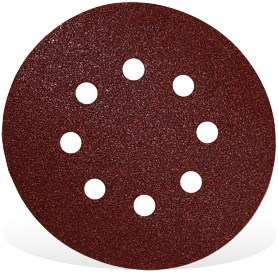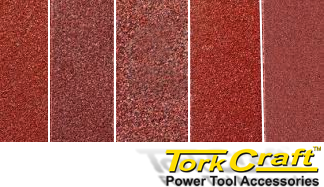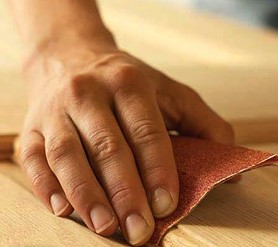



| Quantity | Unit Price | You Save |
|---|---|---|
| 3 or more | R 67.06 | 2.81 % |
| 6 or more | R 65.79 | 4.65 % |
| 12 or more | R 64.53 | 6.48 % |
- Stock: 1630
- Model: ABR36060
- Weight: 0.16kg
- Dimensions: 168.00mm x 206.00mm x 206.00mm
- SKU: ABR36060
- UPC: 6009515804954

For use with random orbital sanders.
SIZE:
ø150mm
GRIT: P60
ABRASIVE: Aluminium oxide
HOLES: Yes
Application:
High performance sanding disc for dry finishing on wood or steel. The hook and loop allows for quick sanding disc change.
Easy to use:
- Unplug the sander before attaching the sheet.
- Align the sanding sheet onto the clean backing pad and press in place.
- Keep the sander flat on the surface with light even pressure during sanding.
- Replace the sanding disc when it is worn.
Align the holes properly with the backing pad for optimum dust extraction.
What is grit?
 When talking about sandpaper 'grit' is a reference to the number
of abrasive particles per inch of sandpaper. The lower the grit the rougher the
sandpaper and conversely, the higher the grit number the smoother the sandpaper.
When talking about sandpaper 'grit' is a reference to the number
of abrasive particles per inch of sandpaper. The lower the grit the rougher the
sandpaper and conversely, the higher the grit number the smoother the sandpaper.

This make sense if you imagine how small the particles on an 1000-grit sandpaper would need to be to fit into a 1' square (25,4mm square). Sandpaper is referred to by the size of its grit (Example 120-grit sandpaper or P120 sandpaper).
 Choice
Choice
You need to choose the grit size of sandpaper depending on the particular job you are trying to accomplish. For heavy sanding and stripping, you need coarse sandpaper measuring 40- to 60-grit; for smoothing surfaces and removing small imperfections, choose 80- to 120-grit sandpaper. For finishing surfaces smoothly, use a super fine sandpaper with 360- to 600-grit. Many jobs require you to “go through the grits.” This means you start the project using lower-grade grit and use finer pieces of sandpaper as you progress. Each time you advance to a higher grit sandpaper, you remove the scratches from the previous layer.




















































































